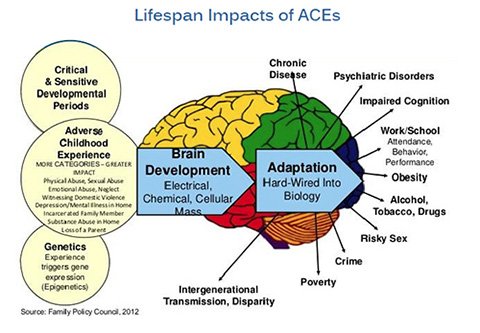The Impact of Adverse Childhood Experiences on Development

Adverse Childhood Experiences (ACEs) refer to potentially traumatic events that occur during childhood and have lasting effects on physical and emotional wellbeing. These experiences can have a profound impact on a child’s development and can influence their overall health and quality of life in adulthood.
Adverse Childhood Experiences encompass a wide range of traumatic events that children may encounter. These experiences can include physical, emotional or sexual abuse, neglect; household dysfunction, such as, parental separation, domestic violence or substance abuse, and other forms of adversity. These experiences can be particularly detrimental during the early years of a child’s life when their brain and bodies are growing and developing.
During the early years, children are highly sensitive to their environment and rely heavily on their caregivers for safety, security and support. When exposed to adverse experiences, children may experience chronic stress, which can disrupt their brain development and affect their ability to regulate emotions and behaviors. This can lead to difficulties in forming healthy relationships, managing stress and engaging in learning activities.
Adverse Childhood Experiences can also impact a child’s physical development. Research has shown a correlation between ACEs and a higher risk of developing chronic diseases, such as diabetes, and mental health disorders later in life. These health consequences highlight the importance of addressing ACEs early on and providing appropriate support and intervention.
Understanding child development is crucial for recognizing the impact of adverse childhood experiences and implementing effective intervention. Children’s development milestones, such as language acquisition, motor skills and social emotional development, can be influenced by the presence of knowledgeable individuals to provide the appropriate support and create nurturing environments for children who have experienced adversity.
Adverse Childhood Experiences have a lasting impact on the development and wellbeing of children. By understanding the effects of ACEs on early years and child development as caregivers can better support children who have experienced adversity. By creating nurturing environments, developing trauma informed approaches, and providing appropriate interventions, we can mitigate the negative consequences of adverse experiences and contribute to the positive growth and long-term success of every child.

 English
English 


Timara
30th Jan 2024This is a very informative article. This information was able to assist me with my assignment on the children’s development. Thank you, Pricilla.
Madiba Balmaceda
30th Jan 2024It is always a pleasure reading your articles….a very timely and informative piece!
Hellen
31st Jan 2024Love this piece, Ms. Joseph…if we can all do our part with the children, what a different world we’ll have…
WadadliLady
31st Jan 2024Very informative. Nice article!
NEEKS
02nd Feb 2024I am in love with your commitment to early childhood development from the toddler stage to cognitive and every other. Your articles truly show that there is not only research being done but experiences are used to enhance relatability. Keep up the great work 👍🏻 👏🏻